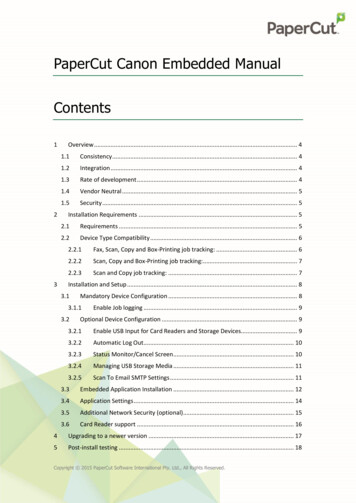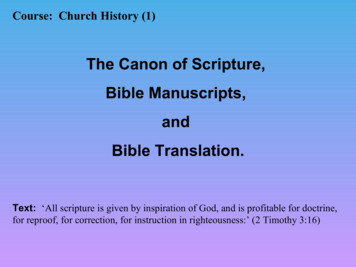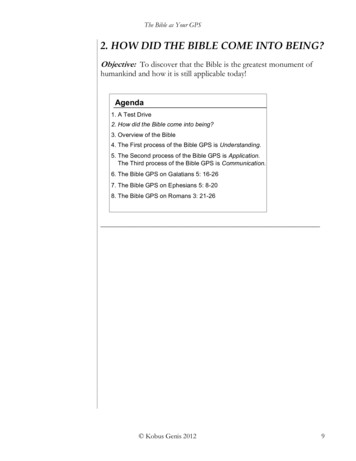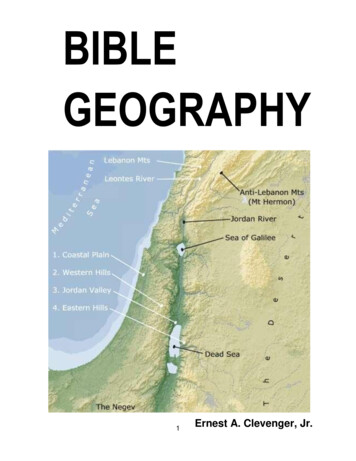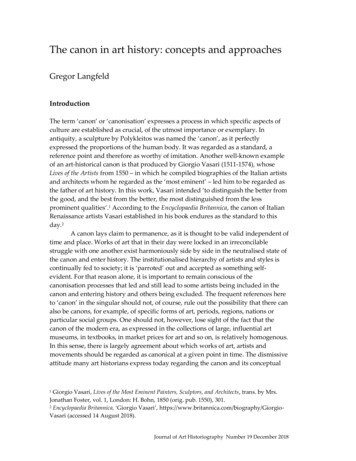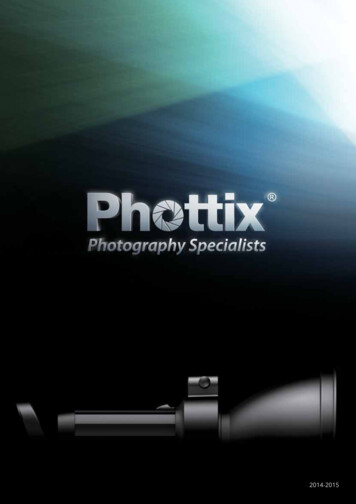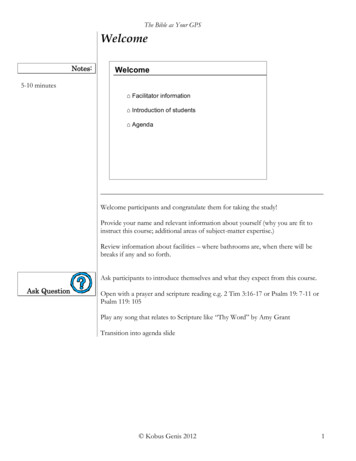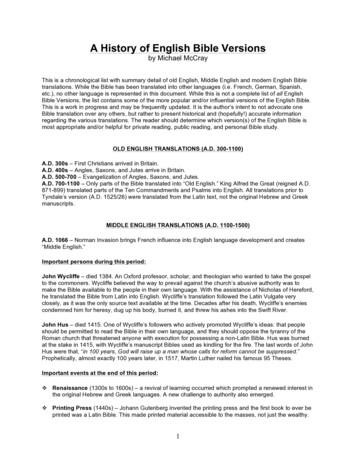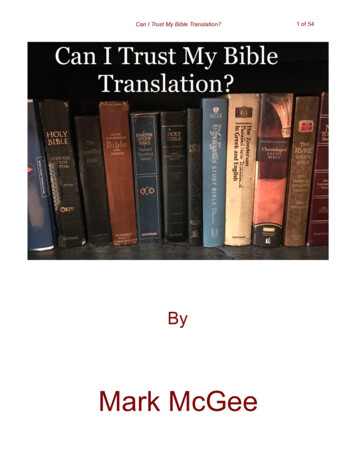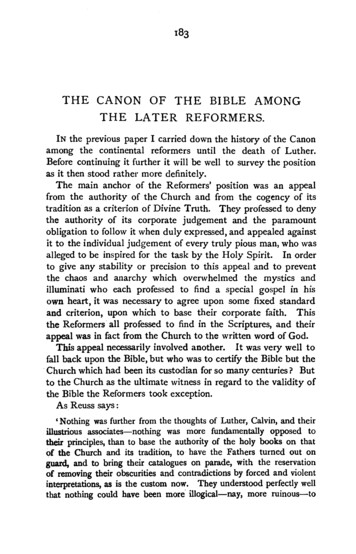
Transcription
183THE CANON OF THE BIBLE AMONGTHE LATER REFORMERS.IN the previous paper I carried down the history of the Canonamong the continental reformers until the death of Luther.Before continuing it further it will be well to survey the positionas it then stood rather more definitely.The main anchor of the Reformers' position was an appealfrom the authority of the Church and from the cogency of itstradition as a criterion of Divine Truth. They professed to denythe authority of its corporate judgement and the paramountobligation to follow it when duly expressed, and appealed againstit to the individual judgement of every truly pious man, who wasalleged to be inspired for the task by the Holy Spirit. In orderto give any stability or precision to this appeal and to preventthe chaos and anarchy which overwhelmed the mystics andilluminati who each professed to find a special gospel in hisown heart, it was necessary to agree upon some fixed standardand criterion, upon which to base their corporate faith. Thisthe Reformers all professed to find in the Scriptures, and theirappeal was in fact from the Church to the written word of God.This appeal necessarily involved another. It was very well tofall back upon the Bible, but who was to certify the Bible but the· Church which had been its custodian for so many centuries? Butto the Church as the ultimate witness in regard to the validity ofthe Bible the Reformers took exception.As Reuss says :'Nothing was further from the thoughts of Luther, Calvin, and theirillustrious associates-nothing was more fundamentally opposed totheir principles, than to base the authority of the holy books on thatof the Church and its tradition, to have the Fathers turned out onguard, and to bring their catalogues on parade, with the reservationof removing their obscurities and contradictions by forced and violentinterpretations, as is the custom now. They understood perfectly wellthat nothing could have been more· illogical-nay, more ruinous-to
184THE JOURNAL OF THEOLOGICAL STUDIEStheir system than to assign to the Church the right of making theBible, when they had disputed her right of making dogma, for the oneincludes the other.' (History of the Canon, Engl. tr., p. 294.)The position was a difficult one. The Reformers were speedilyreminded that the Church existed before the Bible, and that toappeal from the authority of the Church to that of the Bibleon questions like that of the Canon was in effect to appeal fromthe institution which collected the Bible books and first gavethem authority, to its own handiwork. No one could seriouslycontend that the Bible as it stood had fallen from heaven asa complete whole. It is composed of various distinct works,professedly written at different times and by different authors,and the work of collecting and selecting them is a part of historyto be studied and decided by the ordinary methods of historicalenquiry. If the Bible was not to be accepted and taken overon the authority of a Church which claimed to be infallible andunder the continual guidance of divine wisdom, the reasons whyits contents were to be accepted as inspired must be extraordinarily cogent and conclusive since the book itself was infuture to become the single pedestal upon which the Christianfaith was to be planted. The early Reformers confessedly hadto face a stupendous difficulty therefore when they set out toreplace the authority of the Church by some other authorityequally cogent by which to give an irreproachable sanction totheir new Rule of Faith, for they were not like the fortunatefounders of other religions who composed their own Bibles andcould therefore certify them themselves. The Bible they plantedthemselves upon was no new book. They could not deny thatit had been for fifteen centuries the groundwork of the Creedof Christendom.They went through no process of analysing and dissectingafresh the ultimate data of Religion. They nowhere stoppedto enquire whether Divine Revelation was a reality or not,and, if it was, whether it was contained in the Bible rather thanin the sacred books of other religions making similar pretensions.They took their conclusions on both questions for granted ashaving been decided for them long before. What they werealone content to do was to try and substitute some sanction forthe contents of the Bible as they stood other than the authority
BIBLE CANON AMONG LATER REFORMERS185of the Church or, as they phrased it, the traditions of men ; andthus to avoid what they deemed the inconsistency of certifyinga divine message by mere human testimony.In prosecuting this end Luther formulated a theory of hisown which was particularly inconsequent.He tested thecanonicity or validity of any book in the Bible, not by its beingcontained in a recognized ' Bible Canon', but by the conformityof its teaching with what he a prior laid down as the essentialelement of Christianity. He began by making the contents ofcertain books the test and measure of what the others must beif they were to be accepted as genuine Scripture. He did this inthe main by selecting from the Pauline Epistles a dogma which heclaimed to be the dominating factor in true evangelical teaching,namely, the doctrine of Justification by Faith alone, and he appliedthis Pauline and Augustinian conclusion as a touchstone, and heldthat its ' canonicity was to be determined by what each biblicalbook (real or pretended) thus taught regarding Christ and thesalvation of men'. This meant of course the testing of thecanonicity of the several books by an entirely new, self-evolvedand uncertain criterion, and one based only on what the writerhimself judged to be the one cardinal evangelical truth amongthe many possibilities within the Bible teaching ; that is to say,upon an assertion of personal infallibility.On the other hand Calvin and his scholars, while avoiding anyappeal to a general proposition, such as Luther's about Justification, chose a still more elastic and uncertain criterion. Theyclaimed that the Holy Spirit speaking within them teaches menhow to distinguish what is the true word of God from what isspurious.This latter theory, which has pervaded the theological writingsof that large portion of the reformers who claim Geneva for theirMecca, meant basing canonicity on the internal witness of theHoly Spirit speaking in the heart of each man, educated orsimple, normal or excentric, and left the problem to be solvedaccording to the caprice or prejudice of each individual enquirerwho might claim to be internally illuminated, and it naturallyled quite good Christian men to adopt the most contradictoryand inconsistent· theories on the authority of the Bible and itsvarious parts.
186THE JOURNAL OF THEOLOGICAL STUDIESIt is a remarkable fact, not I believe hitherto noticed, thatwhile rejecting tradition as a guide to the legitimate contentsof the Bible, the early reformers should have accepted theBible as preserved by the mediaeval Church at least as containing the maximum of canonical books. The contents of thatBible, there could be no doubt, were only a small selection froma great crowd of others with similar pretensions which had beenexamined and rejected by the Church in early days. Nowheredo we find any evidence, however, that the early reformerssubjected these excluded books to a re-examination and to thepotent test of their own new criteria. Whatever the Church haddiscarded as uncanonical they discarded too quite as a matterof courseFor those who entirely repudiated human tradition as havingany legitimate voice whatever in the matter, this was assuredlymost inconsequent, for it in fact meant that what had beenbrought together by the early Church after much patient discussion and enquiry constituted the whole of the documents whichwithout further enquiry need be considered as worthy of anytoleration when tested by entirely different criteria. Who was tosay that among the literature both of the Old and of the NewTestament rejected by the old Church from its Canon, and stillexisting in such profusion, there may not have been worksentitled to be in the Bible if access to that distinction was to bemeasured by the reformers' new tests?It seems clear that by accepting the old Church's Bible asthe maximum of possible inspired literature, Luther and Calvinin fact conceded the position that the Bible as it stood had beenoriginally certified by the Church; and this was going a longway towards giving the Church paramount authority to decideupon the legitimate contents of the Book, and it meant protanto an abandonment by the reformers of their exclusion ofChurch tradition as a support to the Bible. It is plain thereforethat when they were content without further enquiry to treatthe Church's Bible as containing all the inspired works whichare of authority among Christians, they really abandoned theirobjection to tradition as having any voice in the matter at all.Having so accepted it, and having placed the cardinal limitationon their choice that it must not go outside the contents of the
BIBLE CANON AMONG LATER REFORMERS187accepted Bible of the Church, they were not content to stopthere, but proceeded to resift the contents of the Bible as ithad been thus handed down, and to discard from it several booksas not having the critical characters by which an inspiredwork should be marked. That is to say, having accepted theBible from the Church as a maxz"mum of authoritative materials,they proceeded to separate from this maximum a minimumto which alone they were willing to adhere. In doing this theyproceeded by various methods, and they treated the books ofthe New Testament and those of the Old in different ways.Let us first consider their varying attitude towards the NewTestament.It is necessary to remember in this behalf that the fact of theReformers applying criticism to the origin and contents of theNew Testament books is in no way to be confused with theirattitude towards the Canon of the Bible. Such criticism hadbeen freely applied by the early Fathers, by the mediaevaltheologians and by the men of the New Learning, notably byErasmus, as it was now applied without stint or scruple by Calvinand his followers, no less than by Luther and Zwingli. ThusCalvin in his commentaries, while rejecting the Pauline authorship of the Epistle to the Hebrews, refers to it continually as anauthority of the first quality. He defends the Epistle of Jamesas canonical, although doubtful as to its authorship. Of theSecond Epistle of Peter, about which many of the Fathers haddisputed, he says expressly:'Quamvis aliqua notari possit affinitas, fateor tamen manifestum essediscrimen quod diversos scriptores arguat. Sunt et aliae probabilesconiecturae ex quibus colligere liceat alterius esse potius quam Petri.Interim omnium consensu adeo nihil habet Petro indignum ut vimspiritus apostolici et gratiam ubique exprimat. Quod si pro canonicarecipitur Petrum eius authorem fateri oportet quando . ipse etiamtestatur cum Christo se vixisse. Haec autem fictio indigna essetministro Christi, obtendere alienam personam. Sic igitur constituo, sidigna fide censetur Epistola, a Petro fuisse profectam, non quod earnscripserit ipse sed quod unus aliquis ex discipulis ipsius mandatocomplexus fuerit quae temporum necessitas exigebat . Certe quumin omnibus epistolae partibus Spiritus Christi maiestas se exserat earnprorsus repudiare mihi religio est.'
188THE JOURNAL OF THEOLOGICAL STUDIESThis also, says Reuss, determined the place he assigns to it ;for he alone, among all the reformers, separates it from the firstepistle by interposing those of John and J ames ; a very curiouspeculiarity which modern editions, modified by orthodoxy,have taken care to efface. Reuss adds that, when he madethis statement, he had six editions of Calvin's commentary onthe Catholic Epistles before him, Latin as well as English, allissued under the author's own eyes between 1551 and 1562.Calvin again did not write any commentary on the Apocalypsenor on the two shorter Epistles of St John, but he certainly quotesthe Apocalypse under John's name in the Institutes. The twoepistles, however, he does not quote, and he refers to the firstEpistle in such a way as to exclude them : ' lohannes in suacanonica ', he says of the first Epistle (Inst. iii 2. 24; 3· 23:see Reuss, p. 318 note 2). It is perfectly plain, therefore, thatCalvin, the father of the so-called Reformed churches, no lessthan Luther and Zwingli, exercised the greatest freedom in commenting on the relative value of the New Testament books.In regard to the New Testament Canon, however, he and hisscholars differed widely from their rivals. This is best shewn byan examination of the contents of their respective Bibles, whichare really the best test of such a question. In all the Biblesissued under the auspices of the Genevan reformers and theirfollowers the New Testament Canon as accepted by the LatinChurch is duly followed. It is the same with the official pronouncements of this school of reformers.None of the Helvetic Confessions give any list of canonicalbooks. Such a list, however, was contained in the Confessioncomposed in French by Guy de Bres for the churches of Flandersand the Netherlands in 1565, and afterwards sanctioned by theSynod of Dort in 1619. In this the list of Canonical books ofthe New Testament follows that of the Vulgate explicitly. Inthe Confession of Rochelle, dated in I5JI, the only difference(which is really an immaterial one) is that the Epistle to theHebrews is treated as anonymous and separated from the otherPauline Epistles, and the Apocalypse is attributed merely to'Saint Jean', and not to the Apostle John. This Confessionwas the handiwork of Calvin and his pupil De Chandieu, andwas approved by Henry the Fourth of France.
BIBLE CANON AMONG LATER REFORMERS189It is plain, therefore, that whatever pious esoteric views thewriters of the Reformed church of Geneva and its descendants,including the English Puritans, held in regard to canonical booksproper and to Antilegomena in the New Testament, their viewswere excluded from their Bibles and Confessions, the contents ofwhich constituted their official statement on the subject So thata question about the legitimate contents of the New TestamentCanon never rose among them, and has never done so since.As we have seen, the Anglican Church in its Articles similarlyaccepts the old view of the New Testament Canon. In the sixtharticle it says explicitly, 'All the Books of the New Testament,as they are commonly received, we do receive, and account themCanonical.'Let us now turn to the theory of Luther and Zwingli.Lather's own criterion of a Canonical book, as we have seen,was, z'nter alz'a, whether it conformed or not to his test of teachingthe rigid doctrine of Justification by Faith alone. When thustested, he claimed, as we said in the previous paper, that four ofthe New Testament books as hitherto received by the Churchfailed to comply with his condition, and he accordingly, as wehave seen, discarded them from his strict New Testament Canon.His rejection of them was accepted, as we have further seen, byZwingli, and was endorsed by the various schools of reformerswho accepted Luther as their prophet, in Scandinavia, England,and Holland. The only voice raised against him on the subjectby any of the early reformers was that of his early friend andlater critic Karlstadt. Luther was, however, shortly called tobook by the champions of Rome. Thus, within four years ofthe appearance ofLuther's New Testament, Emser, in the prefaceto the Annotationes, speaks bitterly of his treatment of the NewTestament books. Thus he says :' Aber was solt der nit straffen oder tadeln der auch dem heyligenApostel Sancto Jacobo sein Epistel verschumffirtt vii spricht es sey einrechte strorin Epistel die keyn Euangelische art an ir habe, wolcheBlasphemien und lesterilg ich daii verantworte wil so wir auff die selbeEpistel komen werden.'Again he says:'Und letzten verkurtzt Luther auch das nawe Testament unnd verwurfftunnd verstost etliche biicher daraus, als namlich die Epistel zu den
190THE JOURNAL OF THEOLOGICAL STUDIESEbreern, die Epistel Jacobi, die Epistel Jude, und die heymlicheoffenbariig J oannis welche doch die Christenliche kirch vor tawsentiaren canonizirt und dem testamet Christi eingeleybt hat, wolchen mehrzu glouben, dan tawsent Luthern. Das aber Luther fur wedet wieetzlich aus de alte an disen vier biichern selber gezweyfelt babe, ist garein loss argument, Dann solte der gantzen Christenliche kirche eintrechtige ordniig und bewariig der canonischen biicher nit mehr statoder glaubens bey uns babe, dan etzlicher eintzeln persone wahn oderzweyfel. J a wan man ein ding dariib verwerffen solt, das etzlich darantzweyfeln, solten die ketzer zu letzt nit allein die canonische biichersonder auch wol Christii selber verwerffen wollen, darumb das vil J udeund Heyde an ihm gezweyfelt, und in nicht fur den Son Gottes oderden warhaffiige Messiam gehalte haben' (ff. xvi sq.).Further on again, in his prefaces to the four books we arediscussing, Emser enters at greater length into the questionof their authority and authenticity, and speaks very plainly ofLuther's method of criticism as applied to them.Luther was similarly attacked by a still more persistentchampion of Rome, namely Cochlaeus. Thus, in his workentitled De Canonz'cae Scr pturae & Catholz'cae Eccles aeAutoritate, addressed to Henry Bullinger, 1543, he says:'Nos enim Catholici omnes novi testameti libros pro Canonicis& sacrosanctis habemus, quos hactenus tota tenuit Ecclesia, quosqueconcilium Carthaginense tertium & S. Augustinus . At Lutherus insua in nouum testamentum praefatione, & in plerisque prologis Canoni-carum epistolarum atque Apocalypsis audacissimum sese scripturarumnovi Testamenti censore, iudicemque constituit, aliisque Suermeris adtemeraria de scripturis sanctis iudicia falsasque et impias censuraslicentiae fenestram aperuit atque audendi ansam praebuit. Hae enimipsius, non nostrae sunt propositiones' (cap. iii f. 14}.He then sets out in order the various propositions in regardto the four books in question to which Luther takes exception,and continues :'Haec & id genus plura Lutheri, non nostra, de scripturis novitestamenti sunt iudicia. De quibus audatius adhuc magisque impieiudicavit post eum Otto Brunfelsius (que tibi notissimii fuisse arbitror}in quodam problemate. Is em nulla uult scripturam dici sanctampraeterque vetus Testamentum. Ideo non censet inter sanctas scripturasEvangeliii, sed habet illud pro mera relatione Cabalistica, qua inuicealius erudit alium. Atque hue omnia tendere affirmat, ut apostolos
BIBLE CANON AMONG LATER REFORMERS191hoies fuisse credamus & labi potuisse, atque etia pugnatia scripsisse'(ff. 15 sq.).Again, in his Commentaria de actis et scripturis MartiniLutheri . . usque ad anum M. D. xlvi, published in 1549, we findCochlaeus, on page 6o, writing :'Optimis enim quibusque videbatur Lutherus nimis malitiosegrassari in sacras literas novi Testamenti. E quorum Canone, audacicensura reiiciebat Epistolam ad Hebraeos, Epistolam Iacobi, EpistolamIudae & Apocalypsin Ioannis. Quas sane & atrocibus infamabatcalumniis in suis praefationibus. In praefatione vero generali, etiam insacratissima Evangelia audacissime manum mittebat : volens in primisrepudiandam esse vetustissimam hanc et omnibus Christianis notamac receptam opinionem & sententiam . . . Evangelium enim nonrequirere opera, aut praecepta praescribere, sed solum fidem inChristum docere et dulciter consolari credentes affirmabat.'These and other similar attacks by the champions of Rome,especially after the Council of Trent had emphasized the adherence of the Roman Church to the complete Canon, had tobe met, and the Lutheran apologists found them very difficultto meet without qualifying their master's position very materially.Especially did they find it necessary to go behind his own pontifical pronouncements as to what ought and what ought not tobe found doctrinally in a truly Canonical book, and to importinto their arguments references to the opinions and decisions ofthe early Church, and, in fact, to abandon the rigid appeal tointernal inspiration in regard to Canonicity and to wander intowhat Luther and Zwingli both denounced as an unpardonablefault, namely, to quote traditional and historical argumentsin favour of their position. Thus, as we have seen, Oecolampadius at a very early stage, when giving advice to the Waldensesas to the New Testament Canon, did not quote Luther's Canon,but the Canon of some of the early Fathers who had raisedquestions about the authority of seven and not merely aboutfour books as Antilegomena, but in a very different way fromLuther's.Thus again Flacius, the most devoted of Luther's champions,says of the Bible books :'Distinguuntur quoque, in Canonicos; et dubios ac denique apocryphos, taceo enim iam plane supposititios atque adeo reiectos.
192THE JOURNAL OF THEOLOGICAL STUDIES'Canonicos eos voco, qui plane accepti probatique sunt et inCanone Biblico semper censiti, quos supra recensui. Dubios eosdico, de quibus est dubitatum; ut sunt in N. Testamento EpistolaPetri ii, ad Hebraeos, Iacobi duae posteriores Iohannis, ludae etApocalypsis.'Again, in his tract on the New Testament in the first volumeof the Magdeburg Centuries, having given a list of those writingswhich, according to Eusebius, had always been received asundoubted (pro indubitatis), he continues:'Sunt a utero et alia quaedam hoc seculo scripta, per ecclesias nomineApostolorum aut eorum discipulorum sparsa : quorum quaedam inmedio propter quorundam dubitationem, sunt aliquamdiu relicta, posteavero in numerum catholicorum scriptorum recepta : quaedam veroprorsus pro apocryphis reiecta. Prioris generis sunt : Epistola lacobi,epistola ludae, posterior Petri, et altera ac tertia Ioannis: epistola adHebraeos, et apocalypsis Ioannis. Eusebius de suo tempore loquens,epistolam Iacobi primam inter septem catholicas, et ludae epistolamquoque inter eas unam, et publice in plurimis ecclesiis legi, dicit: sedtamen eas adulterinas esse ex eo affirmat, quod non multi ex veteribusmentionem earum faciant {Eusebius ii eh. 23). Praeter hoc vero argumentum, a testimonio antiquitatis sumptum, alia quoque sunt haudobscura indicia, unde colligi potest, earum autores non esse ApostolosIacobum et ludam. Nam Epistola lacobi ab analogia doctrinaeApostolicae haud mediocriter aberrat, dum iustificationem non fideisoli sed operibus adscribit : et legem appellat legem libertatis, cum lexfit Testamentum generans in servitutem Galat iv. Deinde nee modumdocendi Apostolorum observat. . . . Praeterea sententiis quibusdamPetri et Pauli utitur : nee se appellat Apostolum Christi, sicut Pauluset Petrus faciunt, sed tantum servum Christi. Non igitur est absimilevero, earn epistolam a quodam discipulo Apostolorum sub finem huiusseculi, aut superiori tempore scriptum est.'Iudae epistolam etiam haec arguunt non esse genuinam, quod nonapostolum, sed servum se appellat : quodque ipse se post apostolosvixisse prodit, quum inquit: Vos autem dilecti, memores estis verborum,quae antehac dicta fuerunt ab Apostolis Domini nostri lesu Christi,quod dixerunt vobis, . . . Quod quaedam de verbo ex posteriori Petridescribit, et quod citat sententiam de certamine Michaelis archangeliadversus diabolum de corpore Mosi, et ex vaticinio Enoch, quae inprobatis ceteris scripturae libris non habentur . . . Et quod Iudamnon in Graeciam, sed in Persiam venisse, memoriae proditum est, ubiPersice potius quam Graece scripsisset.'
BIBLE CANON AMONG LATER REFORMERS193Flacius then quotes the opinions of Eusebius in regard to theSecond Epistle of Peter and the Second and Third Epistles ofJohn as not legitimate works, a view in which he apparentlyconcurs, as he does in regard to the Epistle to the Hebrews, ofwhich he concludes :'His et similibus rationibus mota prudens vetustas, quae omnia adavaA.oylav fidei examinare solita est, de Epistola ad Ebraeos iure dubi-tasse videtur.'In regard to the Apocalypse he also quotes Eusebius's phrase:'Alios certis et authenticis sacrae scripturae libris adiudicare: alios.vero eis non annumerare' (iii eh. 25).He discusses the book in many aspects, generally favourably, butends by putting it among those Works 'qui dubitationi obnoxiifuerunt' (Centuriae Magdeburgenses i 451-566).It will be noticed how far Flacius in these paragraphs hadshifted his ground from that occupied by his master, and how hehad fallen back from the latter's largely subjective methods upondistinctions already recognized in the earlier centuries of Christianity between the homo!ogoumena and anti!egome11a, and hadthus really given up Luther's objections to any appeals toauthority on the subject.Flacius was not the only one to do this. Bucer (Enarr. z'nfol. 20) also insists that the early Church recognized onlythe twenty homologoumena as authoritative-that is, he alsobased his position on traditional arguments. The same was thecase with Chemnitz, the most skilful and powerful of the antiRoman controversialists at this time. Thus, in Exam. Trident.ed. 1578, p. 54, he says:Ew.r Quaestio est . an ea scripta, de quibus in antiquissima Ecclesia , . dubitatum fuit, ideo quod testificationes primitivae Ecclesiae dehis non consentirent, . praesens Ecclesia possit facere canonica?Jtoritifici . illam autoritatem usurpant . sed manifestissimum est.: . : esiam nullo modo habere illam autoritatem ; eadem enimratione posset etiam vel canonicos libros reiicere vel adulterinos e. Tota enim haec res . pendet ex certis testificationibuseius Ecclesiae quae tempore Apostolorum fuit,Here .Chemnitz entirely abandons the subjective method ofdealing with the problem of canonicity, and falls back uponVOL.X.0
194THE JOURNAL OF THEOLOGIC.L STUDIESChurch tradition, and is led by this guide not merely to questionthe four books which Luther virtually discarded from the Canon,but the whole of the seven antilegomena.This point of view was pressed home with increasing force bysubsequent controversialists, and at the beginning of the seventeenth century the whole antilegomena of the New Testamentwere actually pronounced by Lutheran controversialists to beapocrypha. Thus M. Hafenreffer, in his Loci Theol; De Script.Sacra, 1603, p. 140, says:'Apocryphi Libri in Nouo Testamento sunt: Posterior Epistola Petri:secunda & tertia Iohannis : Epistola ad Hebrreos : Epistola lacobi :Epistola ludae: & Apocalypsis Ioannis Theologi. Hi apocryphi libriquanquam in diiudicatione dogmatum canonicam authoritatem nonhabeant : quia tamen quae ad institutionem et aedificationem faciuntplurima continent, cum utilitate et fructu, turn privatim legi, turn publicein Ecclesia recitari possunt'J. Schroeder, in his Aphorismi e comp. th. 1599, Disp. I, thes. 16,says of these books,' Apocrypha N. T. sunt: Ep. ad Hebraeos ',&c.Aeg. Hunnius, in his Disp. de Scr. can. 1601 (Dispp. Witt.,16zs, vol. i. de S. Scriptura Canonica pp. 156 f), says:'Fatemur haud gravate, Novi Testamenti Scripta apocrypha maioremecclesiae primitivae meruisse consensum et approbationem, quamapocrypha veteris Testamenti. . . . Nos etiam de autoritate Epistolaead Hebraeos, similiter secundae et tertiae loannis, posterioris EpistolaePetri et apocalypseos non magnopere cum quoquam pugnaturus.'In a later paragraph he speaks of the Epistle' of James and theremaining apocrypha of the New Testament', and adds of theformer:'Quod Christi et doctrinae de ipso tarn rara fit mentio, de rationeautem consequendi vitam aeternam per solum Christum verbumnullum exstat in Epistola bene longa, quae non veteris Testamentiscriptum est ubi doctrina de Christo magis erat implicita.'·In paragraph cxvi of this work, in enumerating the canonicalbooks of the New Testament, he excludes the Epistle of Jamesas well as the five books above mentioned.This view was not merely pressed by private theologians anddoctors. Thus the faculty of Theology at Wittenberg, in itsreply to the Socinian catechism entitled Ausfuhrliche Widerlegung des arianischen Catecht"smi, 1619, p. 13, says:
BIBLE CANON AMONG LATER REFORMERS195'Gleichfalss von den Apocriphis Newes Testaments soli verstandenwerden als da ist Epistola Judae, Jacobi, die ander Epistel S. Petriunnd · dergleichen : deren Gewissheit man so eigentlich nicht als derandern Schriften darthun kan. Dari.imb hette hievon billig mit unterscheid sollen gehandelt werden.'The attitude here adopted in support of Luther's method wasdearly a dangerous one, and opened some very awkwardque' tions in view of the persistent and very able polemics ofthe Jesuits, and we presently find the more advanced Lutherantheologians modifying their ground again. Thus Hafenreffer(!. c.) himself says that, while numbering the antilegomenaamong the Apocrypha, he holds that these New Testamentapocrypha have a greater authority than those of the Old.F. Balduin, in his idea dispos. bib!. p. 68 sq., says:1Est discrimen inter apocryphos V. et N. T. Ex illis nulla confirmaripossunt dogmata fidei sed propter moralia tantum leguntur in ecclesia;horum autem maior est auctoritas ita ut nonnulli etiam ad probandafidei dogmata sint idonei, praesertim Ep. ad Hebraeos et Apocalypsis.'Similarly Dieterich, in his btstitt. catech., 1613, p. 19 f, says ofthese books :1Dubitatum fuit de autore, non de doctrina. Errant autem pontificiiqui absolute parem autoritatem cum canonicis apocryphos libros habere(lictitanl'In his Loci Comm., 1619, p. 17, L. Hutter 1 claims for theApocrypha of the N. T. auctoritatem quandam, arguing thatthey occupy a place intermediate between those of the 0. T.and the canonical books' (Reuss, op. cit. p. 368 note 2).Again, B. Mentzer De S. S., Disp. 1, th. 25 f, says:1Libri apocryphi primi ordinis s. ecclesiastici N.T. in nostris ecclesiisfere eandem obtinent cum canonicis autoritatem.'This modified attitude presently still further gave way as themore orthodox began to
illuminati who each professed to find a special gospel in his own heart, it was necessary to agree upon some fixed standard and criterion, upon which to base their corporate faith. This the Reformers all professed to find in the Scriptures, and their appeal was in fact from the Church to the written word of God.
